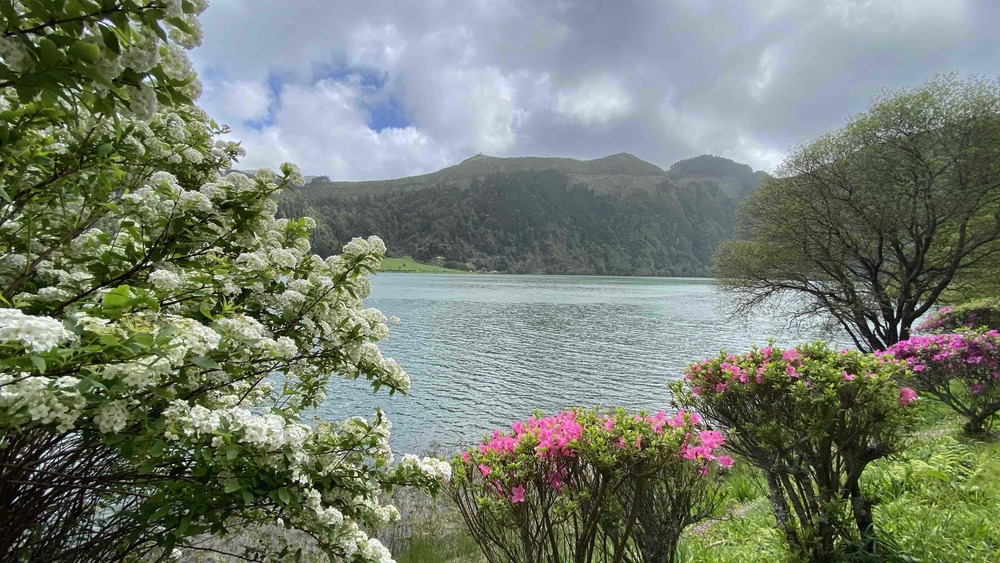There’s something I find very special about islands perched in the middle of the Atlantic Ocean and Portugal has quite a few of them. Last year a trip to Madeira revealed it had more tunnels, goals and hiking trails per head of the population than anywhere else in the world, where they used trees to make wine and boast street tobogganing without snow.
This year’s island escape is a place known for its ‘highs’ and not just where we slept – suspended 8m above the ground in a converted windmill – but for its high pressure weather system which has an oversized bearing on Western Europe’s rainfall.

We ate black pudding with pineapple, breathed in bubbles of sulphur steam, ventured through underground tunnels to reach a hidden valley and almost swam in tidal pools. Oh, and we tried new volcanic wines made from some unique island grapes. Do you know where it is yet?
This year’s Atlantic island getaway was to the Azores Islands (or Açores as I now know them) – volcanic chunks of rock a third of the way across the ocean from Europe towards America but just a two hour and extremely affordable flight from Lisbon. The nine islands of the Açores autonomous region of Portugal span 600km from Flores in the wetter west to São Miguel in the east – the largest island and our destination for this trip.
If you’ve ever seen a photo of São Miguel it’s probably been of the famous Sete Cidades caldera (collapsed volcanic crater) in the west of the island. The landscape is stunning, the roads are amazing and the island is welcoming and accessible.
We hiked the Rota de Água through long underground tunnels dug many years ago for smuggling booze to the Janela do Inferno waterfall and hidden valley. The islands are home to around 250,000 people and straddle the mid-Atlantic ridge, to which they owe their existence.
Undersea tectonic plates are slowly but surely moving apart, allowing molten rock to seep out and occasionally to create islands. And the anticyclone of high pressure which sits over the islands is known as the Açores High and has been called “the gatekeeper of European rainfall.”
Studies have linked increasingly larger Azores Highs to increasingly frequent droughts on the Iberian Peninsula and beyond – and the high pressure zones have been getting bigger since the start of the Industrial Revolution – the impact of climate change.
The steep-cliffed uninhabited islands were discovered by the Portuguese in the early 1400s, even if there are some theories pointing to previous inhabitants. Oranges were once the island’s fruit – a lucrative crop when European explorers were criss-crossing the oceans on voyages of discovery.
Wine grapes were also a hit with the sailors and the Catholic church until phylloxera and various other grape diseases arrived in the late 1800s and did an equally destructive job as they did in the rest of Europe. Pineapples seemed a good alternative.
The conditions aren’t perfect, but grown under glass (or plastic these days) they are very productive…and go unexpectedly go well with blood sausage which is known as Morcela com Ananas and is one of the island’s specialities.
Another is Cozido das Furnas – a Portuguese stew of mixed meats and vegetables but with an Açorense twist: it’s cooked underground in naturally hot volcanic soils. We didn’t try the cozido, but we did try boiling ourselves in the hot springs at Furnas – the most famous lake and hot-spa town in the east of the island. I love the smell of sulphur in the morning.
We enjoyed some amazing grilled fish, and although the limpets weren’t as good as in Madeira, the wine was great and the accommodation – in an old converted windmill – was quite spectacular.
We were blown away by the beauty of the Açores – one island down, eight to go. Visiting more than one island needs an extra flight or a lot more time for a ferry – we’ll maybe try SATA/Azores Airlines next time to reach Pico which is where most of the volcanic wines are made.
Alastair Leithead is a former BBC Foreign Correspondent and freelance journalist now living in a remote rural part of Alentejo. He writes a blog called “Off-Grid and Ignorant in Portugal” and is writing about wine “The Big Portuguese Wine Adventure.”
